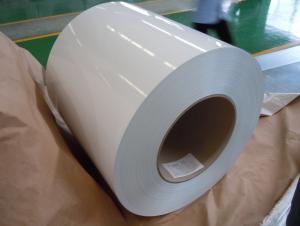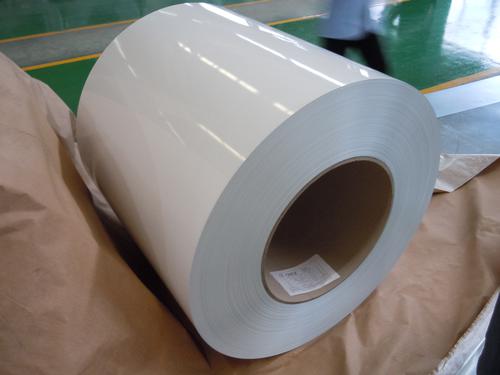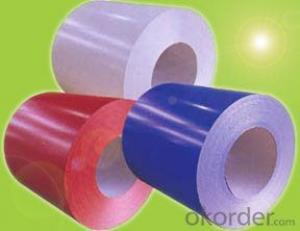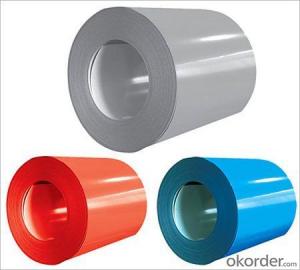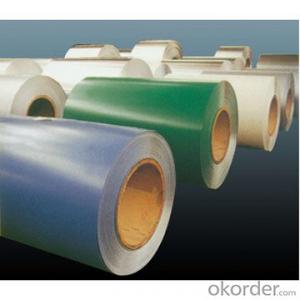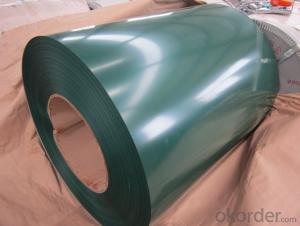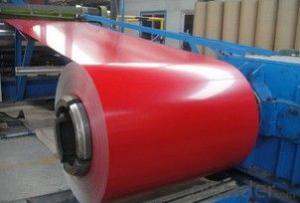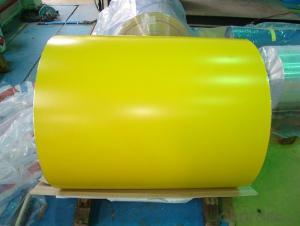PRE-PAINTED STEEL COIL
- Loading Port:
- China Main Port
- Payment Terms:
- TT OR LC
- Min Order Qty:
- -
- Supply Capability:
- -
OKorder Service Pledge
OKorder Financial Service
You Might Also Like
Product Description:
Prepainted galvanized color coated PPGI steel:
| Thickness | 0.12-1.2mm |
| Width: | 700-1250mm |
| Material: | SGCC,SGCD,SECC,SECD,DX51D+Z |
| Zinc coating: | 30-180G/M2 |
| Surface Structure: | galvanized ,zero spangle, regular spangle or normal spangle |
| COLOR: | RAL number or sample colour |
| Coating: | Topside: 5micron primer +15-20microns polyester Backside: 5-8microns primer epoxy. Surface treatment: chromated and oiled, chromated and non-oiled |
II Main characteristics :
1.strong corrosion resistance
2.surface quality
3.conducive to deep processing,such as corrugated steel sheet 4.economy and practicality
III Applications:
Household Appliance:
1.Refrigerator shutter &side panels, Washer, Freezers, Air conditions,
2.Rice Cooker, Microwave Ovens, Water Heaters, Sterilization Cabinets, Range Hoods
3.Computer Panels , DVD/DVB panels, TV back panel etc.
- Q: What are some of the greatest steel guitar songs in the history of country music. Western swing applies also.
- the answer would could be chum Emmons..he's performed with a number of the excellent artists in Nastyville!!! he's the guy who made all those Ray fee songs so bone chilling.
- Q: what is magnetic steel used for and if it can be used for producing kitchenwares utenils like stainless steel basines,mugs and bowls.
- Magnetic steel rusts. That's why kitchenware is often made out of stainless. You can't turn magnetic steel into stainless, sorry. Metalurgy is a complicated subject, and is all about different alloys. It's far too involved to explain in a few paragraphs here, but no, they're not interchangeable in this case unless you want to produce kitchenware that rusts.
- Q: What are the common coil surface finish standards?
- The common coil surface finish standards include mill finish, brushed finish, mirror finish, and embossed finish.
- Q: How are steel coils used in the production of storage containers?
- Steel coils are commonly used in the production of storage containers as they provide the strong and durable material required to withstand heavy loads and protect the stored items. These coils are cut, shaped, and welded to form the structure of the container, ensuring its strength and stability. Additionally, the steel coils can be coated or painted to enhance their corrosion resistance and improve the container's lifespan.
- Q: On how to reinforce steel coils in a container
- The inside of the container is rectangular, four angles with hook, so can the packing time for warehouse experienced workers in the upstairs said, with the steel wire rope and steel reinforcement will lock up, if the mud coil is hollow, the wire rope through the middle and then cross to get on fixed on the four corners, and on the floor on the wooden wedge nail to prevent steel coil rolling.
- Q: How are steel coils inspected for oil or rust residues using chemical analysis?
- Steel coils can be inspected for oil or rust residues using chemical analysis techniques. One of the commonly used methods is Fourier transform infrared spectroscopy (FTIR). In this technique, a small sample of the steel coil is taken and subjected to infrared radiation. The infrared spectrum obtained is then analyzed to identify the presence of specific chemical bonds that are characteristic of oil or rust residues. For detecting oil residues, a common approach is to use the peak at around 2920 cm-1 in the FTIR spectrum, which corresponds to the C-H stretching vibration in hydrocarbon chains. If this peak is observed, it indicates the presence of oil residues on the steel coil. To identify rust residues, the FTIR spectrum is analyzed for the presence of characteristic peaks corresponding to iron oxide or hydroxide compounds. For example, the presence of a peak at around 560 cm-1 suggests the presence of iron oxide (FeO) or iron hydroxide (Fe(OH)3). In addition to FTIR analysis, other chemical analysis techniques can also be utilized, such as X-ray fluorescence spectroscopy (XRF) or energy-dispersive X-ray spectroscopy (EDX). These techniques can provide elemental composition information, allowing for the identification of specific elements associated with oil or rust residues, such as carbon or iron. Overall, the chemical analysis of steel coils for oil or rust residues provides a reliable and accurate method to ensure the quality and cleanliness of the coils before further processing or usage.
- Q: What are the different methods of cutting steel coils into sheets?
- There are several methods used to cut steel coils into sheets, including shearing, slitting, and laser cutting. Shearing involves using a straight blade to cut through the coil, while slitting uses circular blades to make multiple cuts simultaneously. Laser cutting, on the other hand, utilizes a high-powered laser beam to melt through the steel. Each method has its own advantages and is chosen based on factors such as the desired precision, speed, and cost-effectiveness.
- Q: I need to know a name of any site which provides information on Steel structures??
- What information are you looking for specifically? information on steel structures could refer to lots of things. Try the American Institute of Steel Construction, or the American Society of Civil Engineers. Google to find them.
- Q: So we all know a 1000lb steel ball will sink in water, but if you were to leave the center of the ball hollow and fill with air, if the steel ball was big enough in diameter it should float correct? What size would the steel ball need to be to float?
- convert lb to kg = 454 kg = 454 litres = 454,000 cm2 volume (454,000) of a sphere = 4/3 pi * r ^3 calculate r double it to get the diameter of the sphere in cm
- Q: How is steel different than iron?How many different kinds of steel are there?What type is the strongest?Which type is the weakest?
- As first answer says, if you look at the number of commercial steel alloys available and consider that any given alloy can be heat treated to a wide range of physical properties, there are thousands and thousands of potential combinations. Technically, steel is an alloy of Fe and C but there are Fe-C alloys that are called cast irons, not steel, and... there are lots of alloy steels which have significant amounts of other elements added like Cr, Ni, Nb, V, Mo, etc. Fe alloys that have a lot of Cr and or Ni added are called stainless steels and there are dozens of them and many of them can be heat treated to produce a wide range of properties. As far as the strongest or the weakest, you have to get really specific about exactly what you mean because some steels are designed for room temperature properties, some are designed for elevated temperature properties, some for static loads, some for impact loads, some for wear resistance, etc, etc.. Steels make up the largest family of metal alloys (by weight and by volume) that humans use. There are a number of reasons for this but the big reasons include: 1) there is a LOT of iron on earth 2) it is relatively cheap to produce 3) you can easily change the physical properties over a every wide range. As an example... you can take a piece of steel that is so brittle it will shatter if you drop it on the floor and heat treat it so you can bend it like a pretzel without cracking and then heat treat it again to make it very strong and tough (resistant to fracture).
Send your message to us
PRE-PAINTED STEEL COIL
- Loading Port:
- China Main Port
- Payment Terms:
- TT OR LC
- Min Order Qty:
- -
- Supply Capability:
- -
OKorder Service Pledge
OKorder Financial Service
Similar products
Hot products
Hot Searches
Related keywords
